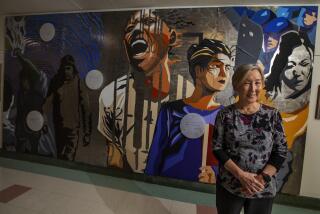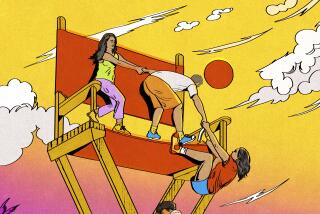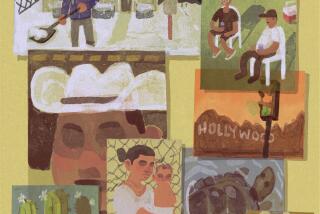A Wake-Up Call at Death’s Door: Chicano Studies Are Our Future : UCLA: A society that will soon revert to a majority Latino population should support the aims of the hunger strike.
A combination of pathos and role-playing generates the surreal ambience surrounding the student encampment in front of Murphy Hall on the UCLA campus. The threadbare rhetoric of the signs hanging from nearby trees and the sight of loincloth-clad dancers would no doubt befuddle most Latinos, as these are not the words or customs most of us live by. Yet the passion and the risk being taken by six students and one faculty member who are in the second week of their hunger strike are all too real to dismiss.
By Monday, medical school professor Jorge Mancillas’ health had already begun to deteriorate beyond that of the students. Whether we agree with the tactics and slogans of the protesters thus far, the health of the strikers urgently merits a more responsible discussion on the very valid issue of whether to establish a department of Chicano studies at UCLA. The protesting students are Joaquin Ochoa, Marcos Aguilar, Cindy Montanez, Maria Lara, Balvina Collazo and Norma Montanez. If this impasse is not broken, we will all--Latino and non-Latino alike--have these seven lives on our collective conscience.
It is remarkable that Angelenos pay so little attention to the cultural transformation of their city. The days of Anglo-American numerical dominance, which lasted more than a century, have been ushered out with little fanfare. Within a decade, Latinos, who are now at parity with Anglos, will once again be the county’s majority population. With “minority” discourse and its attendant themes of dysfunction and entitlement now rendered absurd by the magnitude of the population, we have no language with which to frame a discussion of the future. Destiny takes hold of Los Angeles in silence.
Historian Kevin Starr, who has brilliantly traced this state’s 19th-Century transformation from Latino to Anglo, said that the new Latinization of Los Angeles and California “is so big, so vast, so primally there, that no one can see it, and if they do, they only see it around the edges.”
As an academic field, Chicano studies cannot and should not be reduced to the study of Latinos as existing only in opposition to Anglo society, nor limited to Mexican-Americans to the exclusion of other Latino-Americans. Its proper role ranges far beyond the study of the economic and political barriers that have hindered our common ascendance. The academic exploration of Latinos--the people, not the minority--and their growing place in society is a far more profound issue than the polarized political themes that have been batted around. The current polemic obscures the need to negotiate responsibly the evolution of Californian and American society that the natural growth of the Latino population occasions.
Los Angeles’ much lamented crisis of vision is in part a product of the emergent majority’s lack of a strong intellectual tradition. There has not been a space in which Latino scholars could create their own vision, on their own terms, to share with the wider community of Los Angeles. No one has been imagining a post-Anglo world, and until someone does, we will be doomed to watch passively the slow social disintegration of a departing society, without doing our part in imagining and creating a new one.
The discussion at UCLA needs to move forward and upward from political rhetoric to the intellectual plane to which a Chicano studies department would aspire, the same plane upon which ideas, dreams, poetry, novels, plays, history, music, the arts, theology, jurisprudence, medical ethics, theory, data and method would be brought to bear on the greatest question facing this region: Who are we Californians in this post-Anglo era? We think that even Chancellor Charles Young would find this a valid academic question.
More to Read
Start your day right
Sign up for Essential California for news, features and recommendations from the L.A. Times and beyond in your inbox six days a week.
You may occasionally receive promotional content from the Los Angeles Times.






